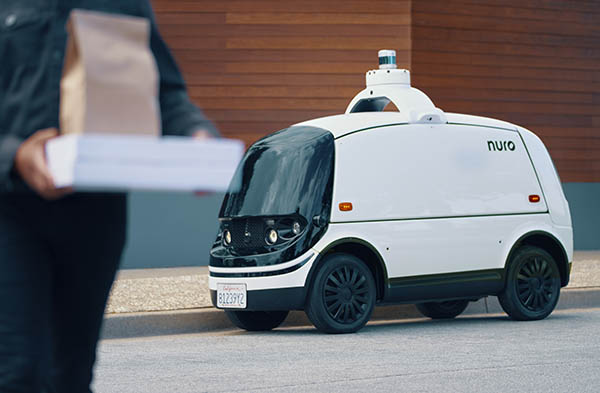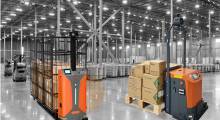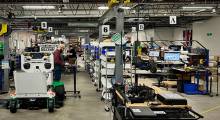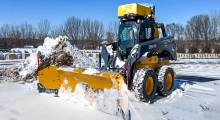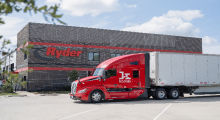Autonomous vehicles are moving from testing to production. Nuro Inc. last week announced that it is spending $40 million to develop a closed-course test track and an end-of-line manufacturing facility in southern Nevada. The Mountain View, Calif.-based company said the new facilities will enable it to commercialize and scale production of its third-generation autonomous vehicle.
“This is a significant moment for Nuro. Building on our tremendous momentum—including strategic partnerships with industry leaders such as Domino’s, Kroger, and FedEx and operations in three states—we are now able to invest in the infrastructure to build tens of thousands of robots,” said Jiajun Zhu, co-founder and CEO of Nuro. “We greatly appreciate the state’s leadership in working with us to finalize this partnership. The decision to place these facilities in Southern Nevada was an easy one.”
Nuro has developed electric autonomous vehicles (AVs) to delivery items from produce to prescriptions to customers' homes. The company has provided its delivery services to communities in Texas, Arizona, and California.
Nuro, BYD to scale up production
Nuro said its new factory is “the industry’s first end-of-line manufacturing facility in America with the capacity to manufacture tens of thousands of delivery vehicles.” It will have 125,000 sq. ft. of space and over 80 acres of property development.
The company said it is partnering with BYD North America, one of the largest OEM networks of electric vehicles in the world. It will deliver an assembled-in-America electric vehicle platform that Nuro will transform into innovative autonomous vehicles.
Nuro added that it will design, develop, and operate all software and digital infrastructure from servers in the U.S. to ensure safety and privacy.
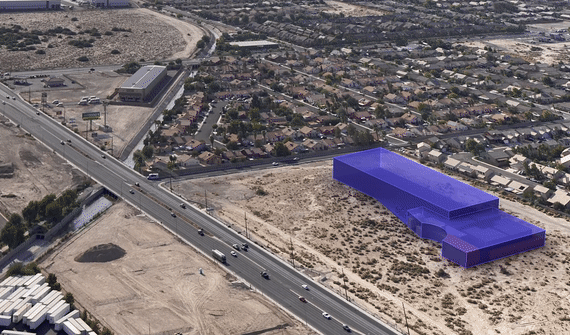
AVs aim for safer roads
Despite the COVID-19 pandemic, more than 38,000 people died in motor vehicle accidents last year, a 7% increase from 2019, according to the National Highway Traffic Safety Administration. Autonomous vehicle makers claim that their technologies can help reduce fatalities caused by human drivers.
Nuro plans to take over 74 acres of the Las Vegas Motor Speedway to build a closed-course testing facility that will allow development and validation of its mobile robots. The testing track will measure performance in a broad range of scenarios, from avoiding pedestrians and pets to giving bicycles space on shared roadways, as well as environmental tests and vehicle systems validation, said the company.
“Investing in the technological advancement of autonomous vehicles will allow us to better address the pressing issue of safety on Nevada’s roads,” said Sen. Jacky Rosen. “I remain enthusiastic about these efforts in Nevada, which will provide benefits to our communities.”
Since enacting its first-in-the-nation autonomous vehicle legislation in 2011, the state of Nevada has been a leader in promoting the safe deployment of potentially lifesaving innovations. The state said Nuro's investment will reinforce its high-tech leadership and economic growth for years to come.
Nuro invests in Nevada economy
The Nevada Governor’s Office of Economic Development estimated that Nuro’s $40 million investment in Southern Nevada community will generate $2.2 billion in economic impact during its first 10 years of operation. Autonomous vehicles could generate $4.1 trillion in economic activity, predicts Steer.
The autonomous vehicle development and production will also create an initial 250 highly skilled career opportunities, said Nuro. These local jobs are careers with long-term growth potential in the autonomous vehicle industry, it said. The company is looking to partner with local universities, community colleges, and career training programs to build a talent pipeline specifically targeting individuals traditionally underrepresented in current technology roles.
“It’s one thing to introduce new jobs to the state—and it’s another thing to introduce high-quality careers to our community,” said Gov. Steve Sisolak. “We’re pleased to welcome Nuro to Southern Nevada and are especially excited for the careers they’ll be offering that will have long-term benefits for our community.”
Construction on the production facility will begin in fall of 2021 and is expected to be completed next year. Nuro said it expects both facilities to be fully operational in 2022.
Article topics
Email Sign Up



